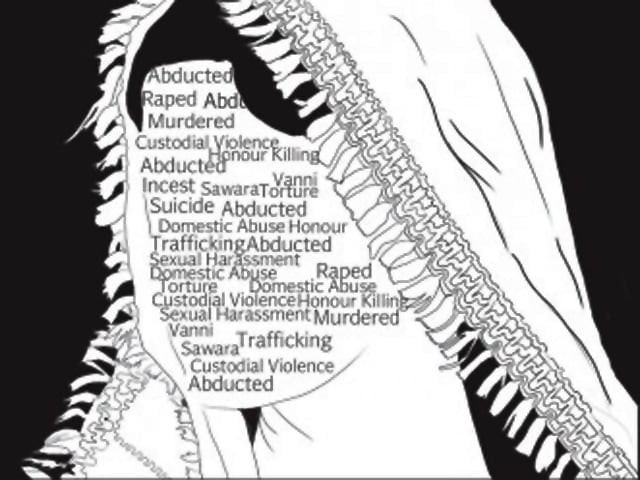Domestic violence: Facing reality: another day, another beating
Most women say that being abused by their spouse is the norm and some even consider it a ‘duty to tolerate it’.

Domestic violence: Facing reality: another day, another beating
In its 2011 report on Pakistan the UK-based human rights watchdog Amnesty International stated “Gender-based violence, including rape, forced marriages, `honor killings’, acid attacks and other forms of domestic violence is being committed with impunity in Pakistan.”
Local NGOs have confirmed a marked rise in cases of domestic abuse, often citing police reluctance to register and investigate such complaints as the reason for the increase.
According to the autonomous Human Rights Commission of Pakistan (HRCP), 791 women became victims of ‘honor’ killings in 2010.
An ‘honor’ killing involves a murder carried out to protect or ‘restore’ the perceived “honor” of a family after a woman is accused of “damaging” it through her disobedience.
An HRCP report stated that the largest number of women killed in the name of ‘honour’, included victims of rape, those who marry a man of their own choice, or those suspected of having any contact with an unrelated man. HRCP says the vast majority of domestic violence cases (not necessarily leading to murder) go unreported.
“The problem is that we are a highly patriarchal society. The status of women is quite low and brutality is growing by the day,” Gulnar Tabussum, convener for the Women’s Action Forum NGO said. A bill aimed at preventing domestic violence lapsed during 2010, because it could not be presented in time to the upper house of parliament. As a Thomson Reuters Foundation report points out, Pakistan also has one of the world’s highest rates of murders related to dowry (money and other gifts given to women at the time of marriage). The tensions this causes, and the violence it can lead to are experienced by scores of women on a daily basis.
Having been beaten, almost daily, by her husband is a routine part of Saadia Bibi’s life. “Ever since I was married nearly seven years ago, I have been slapped, kicked or burned virtually every day. Once or twice a week, my husband decides to stub me with lit cigarettes,” she told reporters in Multan. Sadia said that her ‘misdemeanors’ included cooking food which was tasteless or speaking too loudly on the telephone.
The UN information unit, IRIN has reported that most women they interviewed said that ‘domestic violence’ was considered a given and the norm in most rural areas.
“It is not something one complains about because it is the same story in every third house. It is a rare village woman, whose husband does not beat her,” Sadia said. “What I cannot stand is that my husband now beats my daughters because he says they must learn obedience,” she added.
Previous studies, including one in 1999 by the New York-based Human Rights Watch (HRW) have released findings suggesting that violence against women in Pakistan is an epidemic. HRW has since continued to campaign for laws to more effectively protect women but these laws are either not framed efficiently by the federal government or not implemented effectively by local authorities.
According to a survey released in June 2011 by Thomson Reuters Foundation’s Trust Law, Pakistan is the world’s third most dangerous country for women after Afghanistan and the Democratic Republic of Congo, with 90 percent of women suffering domestic violence. Other forms of physical abuse are also common, based on assessments by gender experts.
Psychologists have stated that the consequences of domestic abuse can be horrendous for women.
In April this year, two men entered the home of 28-year-old Asma Firdous in a village near Multan, cut off six of her fingers, slashed her lips and arms and sliced off her nose. Asma, taken to hospital by her parents, was punished for a dispute her husband had with his relatives. Her future now remains uncertain, with her husband unlikely to accept her back.
In cases of dowry, violence is seldom reported. Humaira Hamid*, 21, said “My husband and his family kept on demanding more and more gifts from my parents - TV sets, furniture, a washing machine and other items. My family is not rich and had already given a lot at the time of the actual marriage. Even now the pressure continues, and I am beaten each time a present does not turn up after they have asked for it.”
Psychologist Asma Khan said that women seldom considered even searching for a way out. “Domestic abuse is so common in Pakistan that women from both the upper and lower classes consider it their duty to just take it. This is not the West, where women are encouraged to leave the men who beat them file charges against them. Here the girls’ own family will be the first to tell her to ‘face reality and do her duty’,” she added.
Like many other women in the same situation, Humaira does not know what to do or where to turn to. “We are all helpless. My parents will never take me back given the stigma of divorce.
It is unacceptable for a woman to live on her own even though I am educated and could support myself. So I have no choice but to tolerate it,” she said. “Thank God that most of my friends are all in the same situation, other wise I would have no one to talk to,” she said.
*The name of the victim has been changed to protect her identity
Published in The Express Tribune, September 30th, 2011.



















COMMENTS
Comments are moderated and generally will be posted if they are on-topic and not abusive.
For more information, please see our Comments FAQ